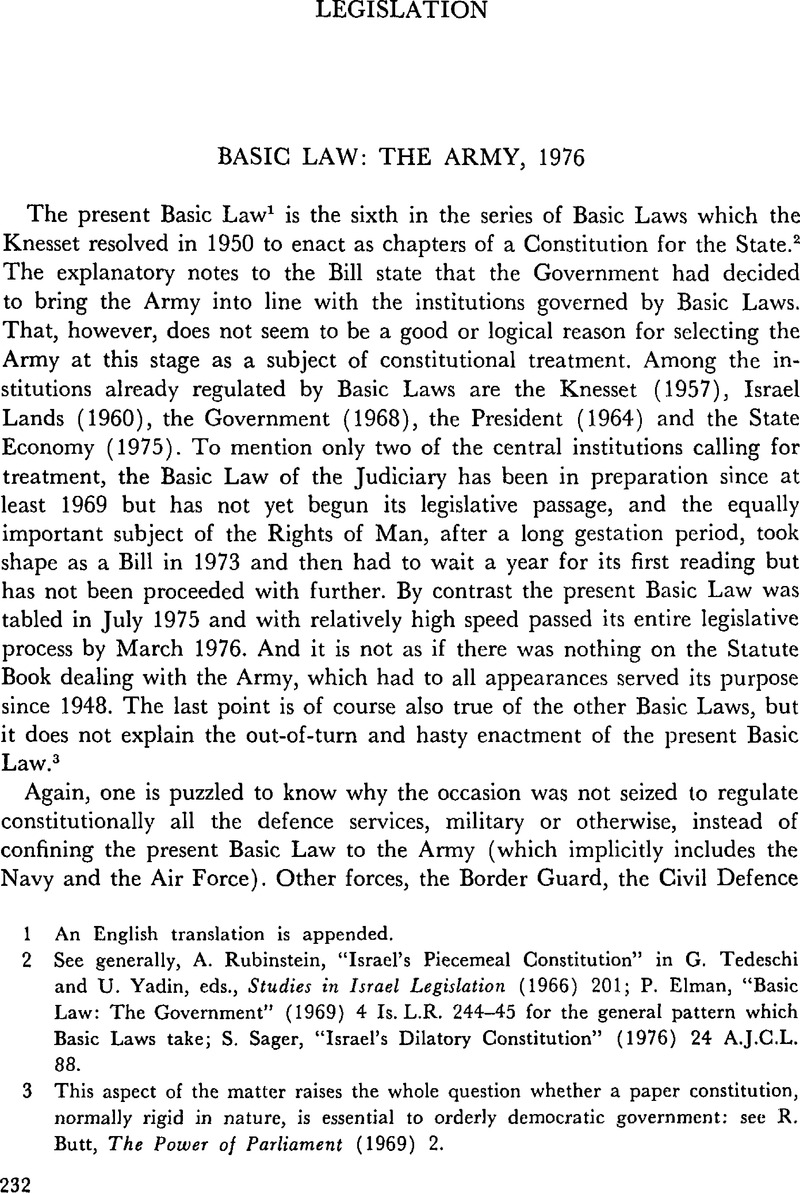Article contents
Basic Law: The Army, 1976
Published online by Cambridge University Press: 12 February 2016
Abstract

- Type
- Legislation
- Information
- Copyright
- Copyright © Cambridge University Press and The Faculty of Law, The Hebrew University of Jerusalem 1977
References
1 An English translation is appended.
2 See generally, Rubinstein, A., “Israel's Piecemeal Constitution” in Tedeschi, G. and Yadin, U., eds., Studies in Israel Legislation (1966) 201Google Scholar; Elman, P., “Basic Law: The Government” (1969) 4 Is. L.R. 244–45 for the general pattern which Basic Laws takeGoogle Scholar; Sager, S., “Israel's Dilatory Constitution” (1976) 24 A.J.C.L. 88.CrossRefGoogle Scholar
3 This aspect of the matter raises the whole question whether a paper constitution, normally rigid in nature, is essential to orderly democratic government: see Butt, R., The Power of Parliament (1969) 2.Google Scholar
4 The Border Guard was in fact established in 1950 as part of the IDF and or ganised entirely on military lines. In 1951, however, it was placed under the control of the Minister of Police. Since 1964, by a decision of the then Prime Minister, many army conscripts have been seconded to serve in the Guard on normal conscript terms and many of them have continued on a permanent basis. No statute directly regulates Border Guard matters. Its functions are said to be to stand guard in the border areas, to conduct operations against in filtrators and terrorists and it has been employed in recent times on more “civilian” duties. Incidentally, under the Prevention of Infiltration Law, 1954, the Minister of Defence, upon the proposal of the CGS, appoints army officers to act as judges in the tribunals dealing with infiltration, whilst the prosecutors are appointed by the CGS.
Even more to the point is the Civil Defence Service. Originally set up in 1948 under emergency regulations, it is now governed by the Civil Defence Act, 1951 (as amended). Its purpose is to undertake measures of defence against attack or danger of attack upon the civilian population by any foreign state or to reduce the effect of such attack, excluding, however, combat measures other than self-defence. The responsible Minister is again the Minister of Defence and the entire structure of the Service bears a clear military character. An officer of the General Staff of the IDF, appointed by the CGS, is Commander, although he is advised by national and district councils composed of governmental and civilian representatives. District commanders are also IDF officers. The Service is manned inter alia by members of the IDF reserve; the Commander has powers of call-up subject to certain safe-guarding limitations. Discipline is maintained on army lines by army officers.
5 On Commissions of Inquiry, see Elman, , “The Commissions of Inquiry Law, 1968” (1971) 6 Is. L.R. 398.Google Scholar
6 “The Government is competent to do in the name of the State, subject to any law, any act the doing of which is not enjoined by law upon another authority”.
7 It is interesting that in the Bill, in place of sec. 3(b) and (c) there is a subsection stating that the CGS “is subject to the civil authority in accordance with this Law”, followed by a separate section in the terms of sec. 3(c).
8 13 L.S.I. 328.
9 9 L.S.I. 184.
10 A suggestion during the first reading that the Committee should be given some part in IDF matters was not taken up: Al HaMishmar 31 July 1975.
11 In Hebrew the term for “in charge of” is the one always used in naming the responsible Minister.
12 Jerusalem Post, 31 July 1975.
13 It is difficult to establish what was and is the practice in army matters. Statements thereon in this Note are taken from Schiff, Z. and Haber, E., eds., Israel, Army and Defence: a Dictionary (1976, in Hebrew)Google Scholar the contributors to which include past CGS's and other senior IDF officers.
14 The latter course would incidentally meet the possible objection that it is desirable to avoid rigidity, since an ordinary law does not face the difficulties of amendment which constitutional laws normally do.
15 Al HaMishmar, 31 July 1975.
16 This is not the place to enter into the difficult question of cabinet responsibility and the position of the Prime Minister in the Israel constitutional system.
17 Sec. 1 of the Interpretation Ordinance (New Version) 1954.
18 See Davar, 31 July 1975.
19 Cf. Jerusalem Post, 31 July 1975.
- 1
- Cited by


